U 7新理念大学英语
大学英语教材unit7答案
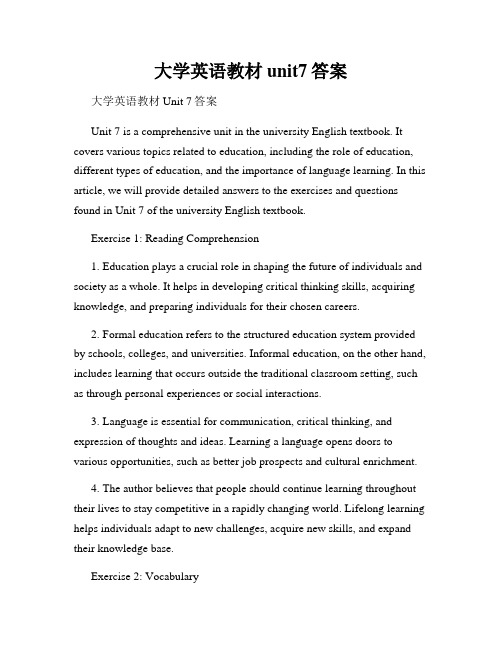
大学英语教材unit7答案大学英语教材Unit 7答案Unit 7 is a comprehensive unit in the university English textbook. It covers various topics related to education, including the role of education, different types of education, and the importance of language learning. In this article, we will provide detailed answers to the exercises and questions found in Unit 7 of the university English textbook.Exercise 1: Reading Comprehension1. Education plays a crucial role in shaping the future of individuals and society as a whole. It helps in developing critical thinking skills, acquiring knowledge, and preparing individuals for their chosen careers.2. Formal education refers to the structured education system provided by schools, colleges, and universities. Informal education, on the other hand, includes learning that occurs outside the traditional classroom setting, such as through personal experiences or social interactions.3. Language is essential for communication, critical thinking, and expression of thoughts and ideas. Learning a language opens doors to various opportunities, such as better job prospects and cultural enrichment.4. The author believes that people should continue learning throughout their lives to stay competitive in a rapidly changing world. Lifelong learning helps individuals adapt to new challenges, acquire new skills, and expand their knowledge base.Exercise 2: Vocabulary1. b) acquire2. d) transform3. c) maximize4. a) interact5. e) accessExercise 3: Grammar1. Many young people lack access to quality education.2. The professor discussed the importance of critical thinking skills.3. Learning a foreign language broadens one's cultural horizons.4. The university aims to foster a collaborative learning environment.5. Online courses provide flexible learning opportunities for students.Exercise 4: SpeakingFor this exercise, students are encouraged to have a discussion with their classmates about the advantages and disadvantages of online education. They should consider factors such as flexibility, access to resources, and personal interaction. The goal is to practice expressing opinions, supporting arguments, and engaging in a meaningful conversation.Exercise 5: WritingAs part of the writing exercise, students are required to write a short essay of approximately 150 words on the topic "The Role of Education in Society". They should discuss the importance of education, its impact onindividuals and society, and potential challenges in access to education. Students should focus on organizing their ideas, using proper grammar and vocabulary, and structuring their essay with an introduction, body paragraphs, and a conclusion.The above answers to the exercises and questions in Unit 7 of the university English textbook provide a comprehensive understanding of the key concepts and topics covered in the unit. By completing these exercises, students will enhance their reading comprehension, vocabulary, grammar, speaking, and writing skills.。
U7大学英语基础教程答案第7单元-课件

Unit Seven
Text A Text B
Lead-in Listening
Communicative Activity
2
Reading in Focus
Unit 7
Ultimate Challenge
Accept the challenges, so you may feel the exhilaration of victory.
Tom: I think that the people who do skateboarding are very _s_k_i_ll_e_d__. It must take a lot of _p_ra_c_t_i_c_e_ to stay on the skateboard _w__h_il_e_ doing so many jumps
But it was a man from New Zealand who made bungee jumping a big sport. His name was Alan John Hackett. Hackett was quite a dare devil. He had once jumped off the Eiffel Tower in Paris, France. Then, in 1988, he wanted to give others a chance to try bungee jumping. At that time, though, the sport was illegal. So Hackett made a deal with New Zealand police. Using his own money, he would fix up a bridge over a river gorge. In return, the police would let him open a legal bungee jumping center on the bridge.
大学英语综合教程 教案_U7
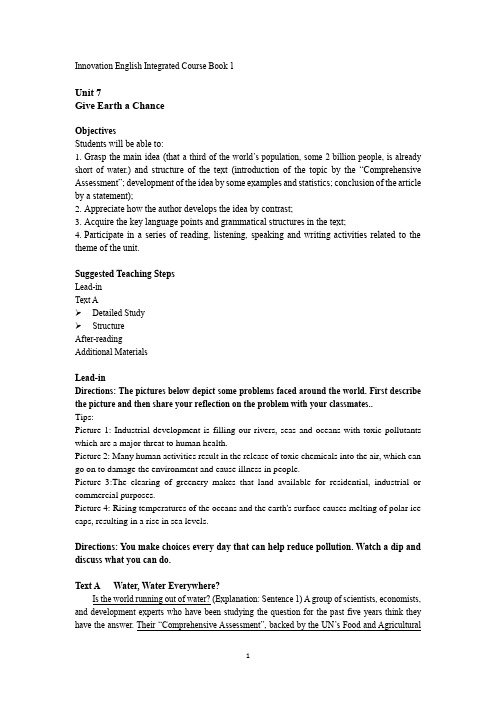
Innovation English Integrated Course Book 1Unit 7Give Earth a ChanceObjectivesStudents will be able to:1.Grasp the main idea (that a third of the world’s population, some 2 billion people, is already short of water.) and structure of the text (introduction of the topic by the “Comprehensive Assessment”; development of the idea by some examples and statistics; conclusion of the article by a statement);2.Appreciate how the author develops the idea by contrast;3.Acquire the key language points and grammatical structures in the text;4.Participate in a series of reading, listening, speaking and writing activities related to the theme of the unit.Suggested Teaching StepsLead-inText A➢Detailed Study➢StructureAfter-readingAdditional MaterialsLead-inDirections: The pictures below depict some problems faced around the world. First describe the picture and then share your reflection on the problem with your classmates..Tips:Picture 1: Industrial development is filling our rivers, seas and oceans with toxic pollutants which are a major threat to human health.Picture 2: Many human activities result in the release of toxic chemicals into the air, which can go on to damage the environment and cause illness in people.Picture 3:The clearing of greenery makes that land available for residential, industrial or commercial purposes.Picture 4: Rising temperatures of the oceans and the earth's surface causes melting of polar ice caps, resulting in a rise in sea levels.Directions: You make choices every day that can help reduce pollution. Watch a dip and discuss what you can do.Text A Water, Water Everywhere?Is the world running out of water? (Explanation: Sentence 1) A group of scientists, economists, and development experts who have been studying the question for the past five years think they have the answer. Their “Comprehensive Assessment”, backed by the UN’s Food and AgriculturalOrganization and various research institutes governments, and aid groups will be released in November. (Explanation: Sentence 2) But during World Water Week, a conference now underway in Sweden, they have revealed some early findings. (Explanation: Sentence 3) The bad news is that a third of the world’s population, some two billion people, is already short of water.(Explanation: Sentence 4) But things do not have to be this way.Roughly 900 million people,the assessment finds, live in river basins where there is barely enough water to keep rivers flowing and lakes filled. (Explanation: Sentence 5) Another 700 million live in basins rapidly approaching this “closed” state, and a billion more live within reach of adequate water supplies but cannot afford to make use of them. (Explanation: Sentence 6) The water table is falling fast in densely populated and poor regions of China, Mexico and India. If current trends in water consumption continue, these grim statistics will only worsen.The main cause is agriculture. It takes roughly 3,000 litres of water to grow enough for one person for one day,or about a litre for each calorie. Demand for water will grow as the world’s population increases and as people eat more — and more meat in particular. Raising livestock requires more water, per calorie, than growing crops. So the assessment suggests that, by 2050, agriculture will consume twice as much water as it does today.(Explanation: Sentence 7) Industrial and domestic use,which now accounts for only a small fraction of water consumption, is also growing quickly. (Explanation: Sentence 8) Global warming adds another layer of uncertainty and risk.In theory, the world would still have more than enough water to feed everyone. But it might require much more food to be traded from sodden parts of Europe, North America, and Russia to dry bits of Africa and Asia. Needless to say, farmers on those continents are in no position to pay for imports of food — and will become even poorer if their water runs short. (Explanation:Sentence 9) A few poor, dry and heavily populated countries, such as Egypt, already depend on food imports, along with the odd rich ones, like Japan. (Explanation: Sentence 10) But most governments are reluctant to put their consumers at the mercy of the world’s imperfect markets.Instead, governments have traditionally tried to increase agricultural output through huge and expensive irrigation projects. But smaller investments in simple devices such as pumps to tap groundwater, are faster to deploy, yield greater returns on capital and bring fewer environmental and social problems. (Explanation: Sentence 11) Modest investments on rain-fed agriculture in particular, could sharply raise farmers’ productivity in poor countries, and so help both to lift their incomes and to reduce the need for an expansion of agriculture elsewhere.Over half of world’s food comes from rain-fed farms, as opposed to irrigated ones. (Explanation:Sentence 12) Most of the world’s poorest farmers, including the vast majority in Africa, rely on rain for their livelihoods. If the rains fail, so do the crops. Channels to harvest and direct rainfall, and small reservoirs or tanks to store it, would not only see them through dry spells, but also allow them to get bigger harvests out of the same fields. If adopted on a grand scale, the assessment argues, such techniques could double crop yields. (Explanation: Sentence 13) In that case, the area under cultivation globally would only have to rise 10% to meet rising demand for food — and there would be plenty of water to go round.(Explanation: Sentence 14)Detailed Study1.Is the world running out of water?【译文】全球水资源快耗尽了吗?run out:1) (~of sth.) to be used up, finished or exhausted 用完,耗尽e.g. We are running out of petrol.我们的汽油快耗尽了。
大学新理念英语教材答案

大学新理念英语教材答案Unit 1 - Hello!Section A:1. Vocabulary and Grammara) Fill in the blanks:1. Hello2. How3. My name is4. Goodbye5. Very well, thank you6. Nice to meet youb) Complete the dialogue:- A: Hello, how are you?- B: I'm very well, thank you. Nice to meet you!- A: Nice to meet you too!c) Translate the sentences:1. 你好,我叫李明。
2. 你好吗?–我很好,谢谢你。
Section B:1. Vocabulary and Grammara) Fill in the blanks:1. Where2. From3. America4. China5. Japan6. Canadab) Complete the dialogue:- A: Where are you from?- B: I'm from China. How about you? - A: I'm from America.c) Translate the sentences:1. 你来自哪里?2. 我来自美国。
Unit 2 - FamilySection A:1. Vocabulary and Grammara) Fill in the blanks:2. Mother3. Father4. Brother5. Sister6. Grandmotherb) Complete the sentences:1. I have a big family.2. My mother is a teacher.3. My father is a doctor.c) Translate the sentences:1. 我有一个幸福的家庭。
新理念教案大学英语第二册

教学对象:大学英语第二册学生教学目标:1. 培养学生的英语阅读理解能力,提高阅读速度和准确性。
2. 增强学生的词汇量和语法知识,提高英语写作水平。
3. 培养学生的口语表达能力,提高英语口语交流能力。
教学内容:1. 阅读理解:包括主题性文章、速读文章和精读文章。
2. 词汇:学习新单词、短语和常用表达。
3. 语法:复习和巩固英语语法知识。
4. 写作:练习英语写作技巧,提高写作水平。
5. 口语:进行英语口语练习,提高口语表达能力。
教学过程:一、导入1. 复习上一节课所学内容,检查学生对知识的掌握情况。
2. 介绍本节课的教学目标和内容。
二、阅读理解1. 阅读主题性文章,引导学生分析文章的主旨和大意。
2. 阅读速读文章,训练学生的快速阅读能力,捕捉文章的主要信息。
3. 阅读精读文章,引导学生分析文章的细节,提高阅读准确性。
三、词汇学习1. 学习新单词、短语和常用表达,让学生通过例句和语境理解其意义。
2. 进行词汇练习,巩固所学词汇。
四、语法学习1. 复习和巩固英语语法知识,包括时态、语态、非谓语动词等。
2. 进行语法练习,提高学生的语法运用能力。
五、写作练习1. 指导学生进行英语写作,包括段落结构、句子结构等。
2. 学生进行写作练习,教师进行点评和指导。
六、口语练习1. 组织学生进行英语口语练习,包括角色扮演、对话练习等。
2. 鼓励学生积极参与,提高口语表达能力。
七、课堂小结1. 总结本节课所学内容,检查学生对知识的掌握情况。
2. 布置课后作业,包括阅读、写作和口语练习。
教学评价:1. 课堂参与度:观察学生在课堂上的参与情况,评价学生的积极性。
2. 知识掌握情况:通过课堂提问和课后作业,评价学生对知识的掌握程度。
3. 写作和口语能力:通过写作和口语练习,评价学生的写作和口语水平。
教学反思:1. 不断调整教学方法和策略,以提高教学效果。
2. 关注学生的个体差异,因材施教,提高学生的学习兴趣和动力。
3. 加强与学生的沟通交流,了解学生的学习需求和困难,及时调整教学计划。
大学英语新课标新时代第三册unit7知识点总结

Unit7 Life of a Salesman1.Surgery=department of surgery 外科Surgeon 外科医生Internal medicine 内科Internist 内科医生2.有“回荡、回响”含义的词汇、短语:echo reverberate resound ring with...3.Capable 能干的、能胜任的incapable 无能力的4.Dependent 依靠的independent 独立的5.Steady 稳固的unsteady 不稳的6.Entry=entryway=entrance 入口7.Briefcase 公文包suitcase 行李箱8.Incline tilt lean (to) slant tip (to)倾斜9.Delivery:a)递送eg: Please allow 28 days for delivery.b)分娩eg: In the end, it was an easy delivery.c)递送的货物eg: I got a delivery of fresh eggs this morning.10.Deliver 交付、发表、递送、释放,给予(vt);实现,传送,履行(vi);投球(n)11.Cerebral palsy 大脑性麻痹12.Surrender 放弃、投降、自首13.Feel like s.th/doing s.th想要(做)某事14.Gain on 逼近gain in 增长、改进gain and loss 损益、得失15.Kick up踢起、扬起kick of a start 全新开始kick around 讨论、各角度考虑Kick oneself 严厉自责kick in 踢开、支付、开始生效16.有“一群”含义的短语:a pack of, a group of, a crowd of, a flock of, a drift of17.Stare toward 盯着18. A section of 一部分19. A disorder of ...的紊乱一.第二部分(13至15段)1.单词1)impatient◆英[ɪm'peɪʃ(ə)nt] 美[ɪm'peʃnt]◆adj. 焦躁的;不耐心的◆[ 比较级more impatient 最高级most impatient ]◆短语impatient of 无法容忍; 不耐烦; 没有办法宽容忍耐Not impatient 不急躁; 不要心急impatient temperament 急躁的情绪be impatient for 渴望;急于be impatient of 不能忍受;不愿意接受too impatient to wait 迫不及待impatient for adj. 急切,渴望be impatient with 对…不耐烦;对…感到急躁◆例句He was impatient of all this waiting.他等得心急了。
新标准大学英语教材u7

新标准大学英语教材u7Unit 7: The Mystery of LanguageIntroduction:The study of language has always fascinated linguists and language enthusiasts alike. It is an intricate and complex system that enables us to communicate, express our thoughts, and understand one another. In Unit 7 of the New Standard College English Textbook, we delve into the intriguing world of language and explore its various facets. This unit introduces us to the concept of language origins, language acquisition, and the diversity of languages across the globe.Section 1: The Origins of LanguageLanguage, as we know it, has evolved over thousands of years. The origins of language continue to be a subject of debate among scholars. Some theories propose that language emerged from a single progenitor language, while others argue for the possibility of multiple language origins. Additionally, this section explores the role of natural selection in shaping the human language faculty, as well as the impact of brain development on language acquisition.Section 2: Language AcquisitionChildren have an innate ability to acquire language effortlessly. This section focuses on the process of language acquisition and the different theories that explain how children learn their mother tongue. We explore the critical period hypothesis and the role of input, interaction, and innateknowledge in language development. Furthermore, the influence of the environment, cultural factors, and individual variations on language acquisition are also discussed.Section 3: Language DiversityLanguage diversity is a remarkable aspect of human society. This section enlightens us about the incredible range of languages spoken around the world. We examine the classification of languages into families and the factors that contribute to language differentiation. Moreover, we discuss endangered languages and the efforts made to preserve linguistic diversity and cultural heritage.Section 4: Language Change and VariationLanguages are not static; they evolve and undergo constant change. This section explores the causes and mechanisms behind language change, including sound change, grammatical evolution, and lexical transformations. We also delve into the concept of language variation, including regional dialects, social dialects, and sociolinguistic factors influencing language variation.Conclusion:Unit 7 of the New Standard College English Textbook unveils the enchanting world of language, offering valuable insights into its origins, acquisition, diversity, and evolution. Understanding the intricacies of language opens doors to a deeper comprehension of human communication and enhances our linguistic competencies. As we embark on this linguisticjourney, let us embrace the beauty and the mysteries of language and unravel the secrets it holds.。
新理念大学英语综合教程第一册答案-精品
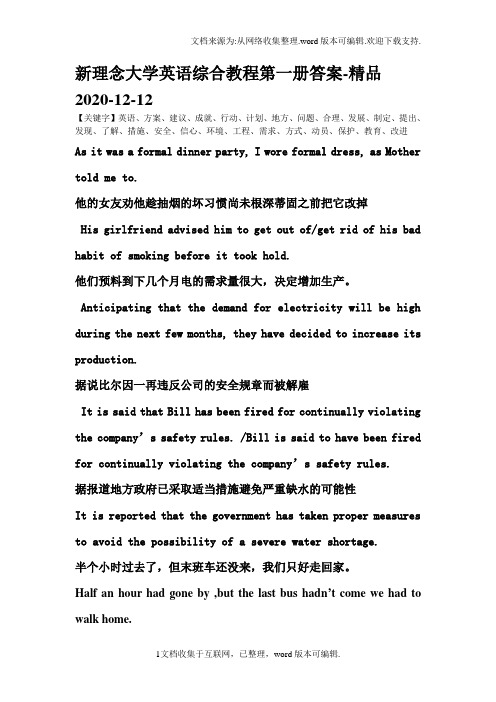
新理念大学英语综合教程第一册答案-精品2020-12-12【关键字】英语、方案、建议、成就、行动、计划、地方、问题、合理、发展、制定、提出、发现、了解、措施、安全、信心、环境、工程、需求、方式、动员、保护、教育、改进As it was a formal dinner party, I wore formal dress, as Mother told me to.他的女友劝他趁抽烟的坏习惯尚未根深蒂固之前把它改掉His girlfriend advised him to get out of/get rid of his bad habit of smoking before it took hold.他们预料到下几个月电的需求量很大,决定增加生产。
Anticipating that the demand for electricity will be high during the next few months, they have decided to increase its production.据说比尔因一再违反公司的安全规章而被解雇It is said that Bill has been fired for continually violating the company’s safety rules. /Bill is said to have been fired for continually violating the company’s safety rules.据报道地方政府已采取适当措施避免严重缺水的可能性It is reported that the government has taken proper measures to avoid the possibility of a severe water shortage.半个小时过去了,但末班车还没来,我们只好走回家。
大学新理念交互英语2作文

大学新理念交互英语2作文The New Concept of University Education。
With the rapid development of society, the traditional concept of university education is facing unprecedented challenges. In order to adapt to the changing times andmeet the needs of the 21st century, universities are exploring new concepts of education to better prepare students for the future.The new concept of university education emphasizes the integration of theory and practice. In the past, students often focused solely on theoretical knowledge, neglectingthe practical skills needed in the workplace. However, the new concept of education emphasizes the importance ofhands-on experience and real-world application of knowledge. Universities are now offering more opportunities for internships, research projects, and practical training to help students develop the skills they need to succeed in their future careers.Another important aspect of the new concept of university education is the emphasis on interdisciplinary learning. In the past, students were often confined totheir own major and had limited exposure to other fields of study. However, the new concept encourages students to explore a wide range of subjects and disciplines, allowing them to develop a more holistic and well-rounded understanding of the world. This interdisciplinary approach not only enriches students' knowledge, but also fosters creativity and innovation.Furthermore, the new concept of university education promotes a student-centered approach to learning. In the past, education was often teacher-centered, with students passively receiving information from their instructors. However, the new concept emphasizes the activeparticipation of students in their own learning process. Universities are now implementing more interactive and collaborative learning methods, such as group discussions, project-based learning, and peer-to-peer teaching, to engage students and promote critical thinking and problem-solving skills.In addition, the new concept of university education places a strong emphasis on global awareness and cultural diversity. With the increasing interconnectedness of the world, it is essential for students to have a broad understanding of different cultures and global issues. Universities are now offering more opportunities for international exchange programs, language learning, and cultural immersion experiences to help students develop a global perspective and become responsible global citizens.Overall, the new concept of university education represents a fundamental shift in the way we approach learning and teaching. By integrating theory and practice, promoting interdisciplinary learning, adopting a student-centered approach, and emphasizing global awareness, universities are preparing students to thrive in the complex and rapidly changing world of the 21st century. This new concept of education not only benefits individual students, but also contributes to the advancement of society as a whole.。
Unit 7 Science 新理念交互英语教程1课件

otherwise adv. 否则;不然
Back
Passage
Script
Listen to the passage three times and fill in the blanks.
Back
Passage
It is generally believed that there is a good supply of fresh
cannot ⑤ survive on the earth.
Section B Open Your Mouth
Survey
Students talk about scientific inventions they know. Make a survey (调查) on what electronic products and electrical products your classmates use in daily life.
water. But to our disappointment, the fact is just the ① opposite.
As we can see, the world population is growing rapidly
② day by day. So enough fresh water is needed to feed such a big population. What’s more, with the ③ developmentof industry,
Sentence
1. What do you think of junk food? 2. How do you like China? 3. I’m deeply attracted by jazz. How about you? 4. Do you like the sofa in that store? 5. Which do you prefer, coffee or tea?
新理念交互英语听力训练教程(四色)unit7答案

新理念交互英语听力训练教程(四色)unit7答案全新版第二版综合B4U7-APartIListeningComprehension(15minutes)Section ADirections: In this section,you will hear ten statements.Numbers 1 to 6 are based on Text A while the rest are based on Text B.Each statement will be read ONLY ONCEListen carefullv and decide whether each statement is true or false1.A)T B)FScript: The falling of the World Trade Center shattered Americansillusion about the nation's invulnerability.正确答案: A2.A)T B)FScript: The suicidal attack on the Pentagon took place at the same time as the attacks on the World Trade Center. 正确答案: B3.A)T B) FScript: The 9/11 terrorist attacks were called as thesecond Pearl Harbor by somecommentators.正确答案: A4.A)T B)FScript: A new World Trade Center will be rebuilt on the spot where it once stood正确答案: B5.A)T B)FScript: Bearing the memory in mind,New Yorkers carried on their lives and rose to fight against terrorism.正确答案: A6.A)T B)FScript: Although time can heal the wounds in the heart of peoplethe memory will never fade away.正确答案: A7.A)T B)FScript: The joint attack on al Qaeda and its Taliban allies successfully drew the Al Qaedas leaders into the mountainson the Pakistan border正确答案: A8.A)T B) FScript: The lraq war turned out to be wrong because there were no mass destructive weapons found.正确答案: A9.A)T B) FScript: Nowal Qaeda and its Taliban allies no longer threaten Afghanistan,but just Pakistan itself.正确答案: B10.A)T B)FScript: The author implies that the war should be made a partisan matter rather than for public concern.。
新理念教案大学英语
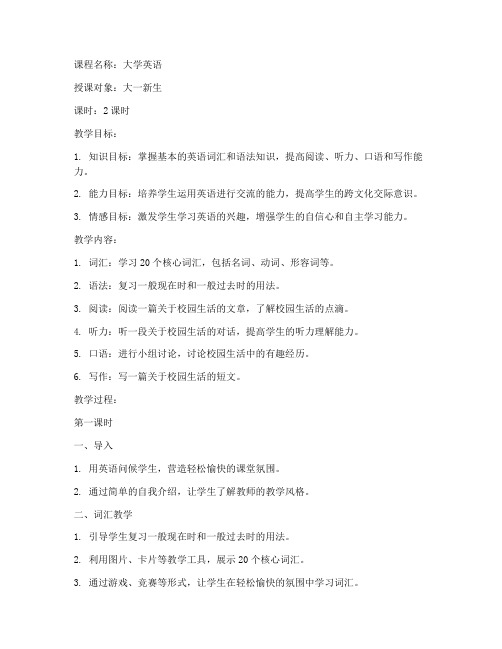
课程名称:大学英语授课对象:大一新生课时:2课时教学目标:1. 知识目标:掌握基本的英语词汇和语法知识,提高阅读、听力、口语和写作能力。
2. 能力目标:培养学生运用英语进行交流的能力,提高学生的跨文化交际意识。
3. 情感目标:激发学生学习英语的兴趣,增强学生的自信心和自主学习能力。
教学内容:1. 词汇:学习20个核心词汇,包括名词、动词、形容词等。
2. 语法:复习一般现在时和一般过去时的用法。
3. 阅读:阅读一篇关于校园生活的文章,了解校园生活的点滴。
4. 听力:听一段关于校园生活的对话,提高学生的听力理解能力。
5. 口语:进行小组讨论,讨论校园生活中的有趣经历。
6. 写作:写一篇关于校园生活的短文。
教学过程:第一课时一、导入1. 用英语问候学生,营造轻松愉快的课堂氛围。
2. 通过简单的自我介绍,让学生了解教师的教学风格。
二、词汇教学1. 引导学生复习一般现在时和一般过去时的用法。
2. 利用图片、卡片等教学工具,展示20个核心词汇。
3. 通过游戏、竞赛等形式,让学生在轻松愉快的氛围中学习词汇。
三、阅读教学1. 预习文章,了解文章大意。
2. 阅读文章,回答问题,检查学生的阅读理解能力。
3. 分组讨论,让学生分享自己对文章的理解和感悟。
四、听力教学1. 播放听力材料,让学生初步了解对话内容。
2. 播放第二遍听力材料,让学生填写答案。
3. 分析听力材料,讲解听力技巧。
第二课时一、复习1. 回顾上节课学习的词汇和语法知识。
2. 进行简单的问答,检查学生的掌握情况。
二、口语教学1. 分组讨论,让学生分享自己在校园生活中的有趣经历。
2. 鼓励学生用英语进行表达,提高口语水平。
三、写作教学1. 学生根据上节课讨论的内容,写一篇关于校园生活的短文。
2. 教师批改作文,指出学生的优点和不足,并进行讲解。
四、总结1. 回顾本节课的学习内容,总结所学知识。
2. 布置课后作业,巩固所学知识。
教学反思:1. 本节课的教学目标基本达成,学生在词汇、语法、阅读、听力、口语和写作等方面都有所提高。
大学新理念英语教案
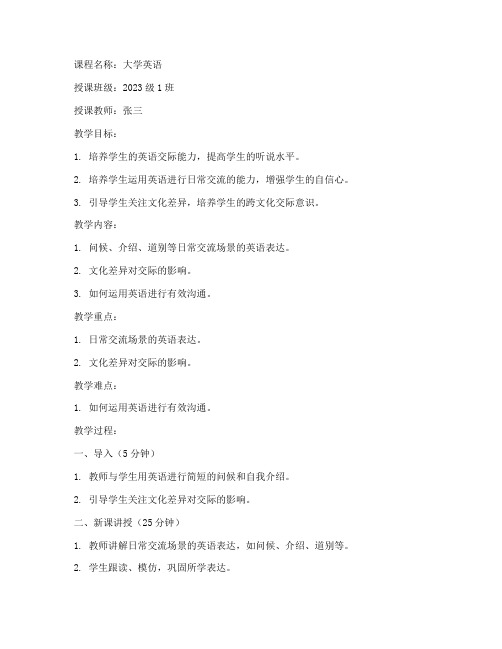
课程名称:大学英语授课班级:2023级1班授课教师:张三教学目标:1. 培养学生的英语交际能力,提高学生的听说水平。
2. 培养学生运用英语进行日常交流的能力,增强学生的自信心。
3. 引导学生关注文化差异,培养学生的跨文化交际意识。
教学内容:1. 问候、介绍、道别等日常交流场景的英语表达。
2. 文化差异对交际的影响。
3. 如何运用英语进行有效沟通。
教学重点:1. 日常交流场景的英语表达。
2. 文化差异对交际的影响。
教学难点:1. 如何运用英语进行有效沟通。
教学过程:一、导入(5分钟)1. 教师与学生用英语进行简短的问候和自我介绍。
2. 引导学生关注文化差异对交际的影响。
二、新课讲授(25分钟)1. 教师讲解日常交流场景的英语表达,如问候、介绍、道别等。
2. 学生跟读、模仿,巩固所学表达。
3. 教师举例说明文化差异对交际的影响,如中西方在时间观念、空间观念等方面的差异。
4. 学生讨论文化差异对交际的影响,分享自己的观点。
三、实践环节(20分钟)1. 教师设置情景,如机场接机、餐厅就餐等,让学生运用所学英语进行角色扮演。
2. 学生分组进行练习,教师巡回指导,纠正发音、语调等方面的错误。
3. 学生展示练习成果,教师点评并给予指导。
四、总结与作业布置(5分钟)1. 教师总结本节课所学内容,强调文化差异对交际的影响。
2. 布置作业:学生以小组为单位,选择一个日常交流场景,用英语进行情景对话。
教学反思:1. 本节课通过角色扮演、情景对话等形式,让学生在真实的语境中运用英语进行交际,提高了学生的听说能力。
2. 教师应关注学生的个体差异,针对不同学生的需求进行个性化指导。
3. 在今后的教学中,应加强文化差异的教学,培养学生的跨文化交际意识。
教学评价:1. 学生能够熟练运用日常交流场景的英语表达。
2. 学生在角色扮演、情景对话中能够正确运用英语进行交际。
3. 学生对文化差异对交际的影响有了一定的认识。
新编英语教程7unit seven The Aims of Education

Culture is activity of thought, and receptiveness to beauty and humane feeling. Scraps of information have nothing to do with it. A merely well-informed man is the most useless bore on God’s earth. What we should aim at producing is men who possess both culture and expert knowledge in some special direction. Their expert knowledge will give them the ground to start from, and their culture will lead them as deep as philosophy and as high as art. We have to remember that the valuable intellectual development is self-development, and that it mostly takes place between the ages of sixteen and thirty. As to training, the most important part is given by mothers before the age of twelve. A saying due to Archbishop Temple illustrates my meaning. Surprise was expressed at the success in after-life of a man, who as a boy at Rugby had been somewhat undistin-guished. He answered, “It is not what they are at eighteen, it is what they become afterwards that matters.”In training a child to activity of thought, above all things we must beware of what I will call “inert ideas”—that is to say, ideas that are merely received into the mind without being utilised, or tested, or thrown into fresh combinations.In the history of education, the most striking phenomenon is that schools of learning, which at one epoch are alive with a ferment of genius, in a succeeding generation exhibit merely pedantry and routine. The reason is, that they are overladen with inert ideas. Education with inert ideas is not only useless: it is, above all things, harmful—Corruptio optimi, pessima. Except at rare intervals of intellectual ferment, education in the past has been radically infected with inert ideas. That is the reason why uneducated clever women, who have seen much of the world, are in middle life so much the most cultured part of the community. They have been saved from this horrible burden of inert ideas. Every intellectual revolution which has ever stirred humanity into greatness has been a passionate protest against inert ideas. Then, alas, with pathetic ignorance of human psychology, it has proceeded by some educational scheme to bind humanity afresh with inert ideas of its own fashioning.Let us now ask how in our system of education we are to guard against this mental dry rot. We enuncia te two educational commandments, “Do not teach too many subjects,” and again, “What you teach, teach thoroughly.”The result of teaching small parts of a large number of subjects is the passive reception of disconnected ideas, not illumined with any spark of vitality. Let the main ideas which are introduced into a child’s education be few and important, and let them be thrown into every combination possible. The child should make them his own, and should understand their application here and now in the circumstances of his actual life. From thevery beginning of his education, the child should experience the joy of discovery. The discovery which he has to make, is that general ideas give an understanding of that stream of events which pours through his life, which is his life. By understanding I mean more than a mere logical analysis, though that is included. I mean “understanding’ in the sense in which it is used in the French proverb, “To understand all, is to forgive all.” Pedants sneer at an education which is useful. But if education is not useful, what is it? Is it a talent, to be hidden away in a napkin? Of course, education should be useful, whatever your aim in life. It was useful to Saint Augustine and it was useful to Napoleon. It is useful, because understanding is useful.I pass lightly over that understanding which should be given by the literary side of education. Nor do I wish to be supposed to pronounce on the relative merits of a classical or a modern curriculum. I would only remark that the understanding which we want is an understanding of an insistent present. The only use of a knowledge of the past is to equip us for the present. No more deadly harm can be done to young minds than by depreciation of the present. The present contains all that there is. It is holy ground; for it is the past, and it is the future. At the same time it must be observed that an age is no less past if it existed two hundred years ago than if it existed two thousand years ago. Do not be deceived by the pedantry of dates. The ages of Shakespeare and of Molière are no less past than are the ages of Sophocles and of Virgil. The communion of saints is a great and inspiring assemblage, but it has only one possible hall of meeting, and that is, the present, and the mere lapse of time through which any particular group of saints must travel to reach that meeting-place, makes very little difference.Passing now to the scientific and logical side of education, we remember that here also ideas which are not utilised are positively harmful. By utilising an idea, I mean relating it to that stream, compounded of sense perceptions, feelings, hopes, desires, and of mental activities adjusting thought to thought, which forms our life. I can imagine a set of beings which might fortify their souls by passively reviewing disconnected ideas. Humanity is not built that way except perhaps some editors of newspapers.In scientific training, the first thing to do with an idea is to prove it. But allow me for one moment to extend the meaning of “prove”; I mean—to prove its worth. Now an idea is not worth much unless the propositions in which it is embodied are true. Accordingly an essential part of the proof of an idea is the proof, either by experiment or by logic, of the truth of the propositions. But it is not essential that this proof of the truth should constitute the first introduction to the idea. After all, its assertion by the authority of respectable teachers is sufficient evidence to begin with. Inour first contact with a set of propositions, we commence by appreciating their importance. That is what we all do in after-life. We do not attempt, in the strict sense, to prove or to disprove anything, unless its importance makes it worthy of that honour. These two processes of proof, in the narrow sense, and of appreciation, do not require a rigid separation in time. Both can be proceeded with nearly concurrently. But in so far as either process must have the priority, it should be that of appreciation by use.Furthermore, we should not endeavour to use propositions in isolation. Emphatically I do not mean, a neat little set of experiments to illustrate Proposition I and then the proof of Proposition I, a neat little set of experiments to illustrate Proposition II and then the proof of Proposition II, and so on to the end of the book. Nothing could be more boring. Interrelated truths are utilised en bloc, and the various propositions are employed in any order, and with any reiteration. Choose some important applications of your theoretical subject; and study them concurrently with the systematic theoretical exposition. Keep the theoretical exposition short and simple, but let it be strict and rigid so far as it goes. It should not be too long for it to be easily known with thoroughness and accuracy. The consequences of a plethora of half-digested theoretical knowledge are deplorable. Also the theory should not be muddled up with the practice. The child should have no doubt when it is proving and when it is utilising. My point is that what is proved should be utilised, and that what is utilised should—so far, as is practicable—be proved. I am far from asserting that proof and utilisation are the same thing.。
全新版大学英语笔记Unit7 book1

1.the kind of mental feats animals perform when dealing with captivity and the dominant species on the planet — humans. (Para. 2)1) What do you learn from this sentence?(Animals have the abilities to deal with human beings’ captivity though human beings ar e more intelligent than them.)2) Paraphrase the sentence.(Animal show great intelligence when they deal with human beings’ captivity even though human beings control and dominate this planet.)3) Translate the sentence into Chinese.(即动物在对付樊笼生活和地球上的主宰物种——人类——时所表现的高超的思维技能。
)2.Arriving on the scene, Jendry offered Colo some peanuts, only to be met with a blank stare. (Para. 3)How to understand “only to”?(It is often used to indicate that sb. does sth. with a disappointing or surprising result. Infinitive “to” functions as a result adverbial.)More examples:- He hurried to the railway station, only to find that the train had left.- He had once tried inviting her out, only to meet with a rather cool response.3.Colo then broke the key chain and gave Jendry a link, perhaps figuring, Why give her the whole thing if I can get a bit of pineapple for each piece? (Para. 4)1) What conclusion can you draw about Colo?(Colo is a good bargainer, and this case shows that animals may really have intelligence.)2) Translate the sentence into Chinese.(科洛然后把钥匙链拉断,给了延德里一段,或许是在算计,要是每一小段都能换片菠萝,我干嘛要全都给她?)4.But the orangutan’s understanding of money seemed to extend far beyond simple dealings. (Para. 5)1) Paraphrase the sentence.(What the orangutan understands is more than just simple dealings.)2) Translate the sentence into Chinese.(但这头猩猩对钱币的理解似乎远远超出了简单的交易。
新理念教案大学英语
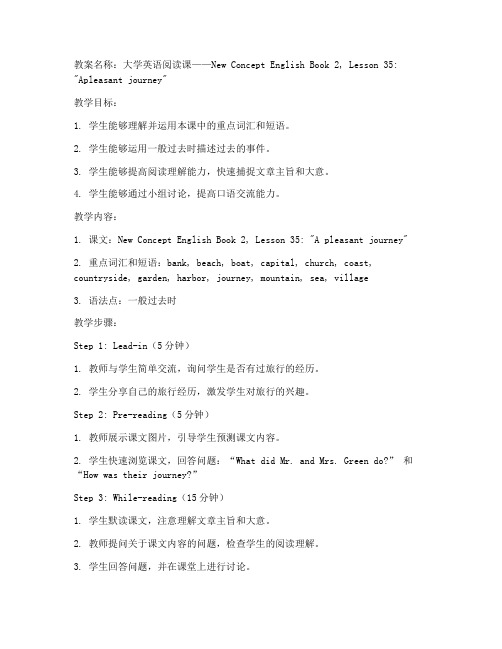
教案名称:大学英语阅读课——New Concept English Book 2, Lesson 35: "Apleasant journey"教学目标:1. 学生能够理解并运用本课中的重点词汇和短语。
2. 学生能够运用一般过去时描述过去的事件。
3. 学生能够提高阅读理解能力,快速捕捉文章主旨和大意。
4. 学生能够通过小组讨论,提高口语交流能力。
教学内容:1. 课文:New Concept English Book 2, Lesson 35: "A pleasant journey"2. 重点词汇和短语:bank, beach, boat, capital, church, coast, countryside, garden, harbor, journey, mountain, sea, village3. 语法点:一般过去时教学步骤:Step 1: Lead-in(5分钟)1. 教师与学生简单交流,询问学生是否有过旅行的经历。
2. 学生分享自己的旅行经历,激发学生对旅行的兴趣。
Step 2: Pre-reading(5分钟)1. 教师展示课文图片,引导学生预测课文内容。
2. 学生快速浏览课文,回答问题:“What did Mr. and Mrs. Green do?” 和“How was their journey?”Step 3: While-reading(15分钟)1. 学生默读课文,注意理解文章主旨和大意。
2. 教师提问关于课文内容的问题,检查学生的阅读理解。
3. 学生回答问题,并在课堂上进行讨论。
Step 4: Post-reading(15分钟)1. 教师引导学生运用一般过去时描述过去的事件。
2. 学生分组,每组选择一个旅行地点,用英语编写一段描述过去旅行的故事。
3. 各组轮流朗读自己的故事,其他学生听后进行评价。
Step 5: Summary and homework(5分钟)1. 教师对本节课进行总结,强调一般过去时的运用和阅读理解的重要性。
新理念英语上机测试(华工版)-B3U7-A
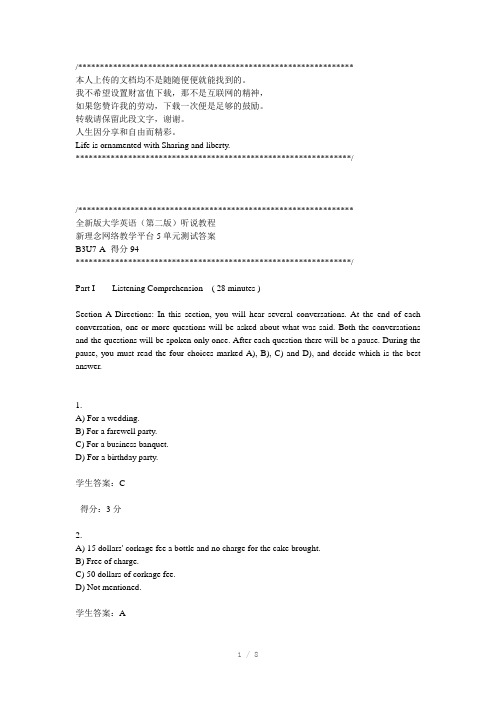
/***************************************************************本人上传的文档均不是随随便便就能找到的。
我不希望设置财富值下载,那不是互联网的精神,如果您赞许我的劳动,下载一次便是足够的鼓励。
转载请保留此段文字,谢谢。
人生因分享和自由而精彩。
Life is ornamented with Sharing and liberty.***************************************************************//***************************************************************全新版大学英语(第二版)听说教程新理念网络教学平台5单元测试答案B3U7-A 得分94***************************************************************/Part I Listening Comprehension ( 28 minutes )Section A Directions: In this section, you will hear several conversations. At the end of each conversation, one or more questions will be asked about what was said. Both the conversations and the questions will be spoken only once. After each question there will be a pause. During the pause, you must read the four choices marked A), B), C) and D), and decide which is the best answer.1.A) For a wedding.B) For a farewell party.C) For a business banquet.D) For a birthday party.学生答案:C得分:3分2.A) 15 dollars' corkage fee a bottle and no charge for the cake brought.B) Free of charge.C) 50 dollars of corkage fee.D) Not mentioned.学生答案:A得分:3分3.A) Review her cover letter at home.B) Go to the employment fair with her revised cover letter.C) Go to see the advertisement.D) Help the man to review his cover letter.学生答案:B得分:3分4.A) Grilled cheese.B) Peanut butter and jelly.C) Burger king.D) Either a grilled cheese or peanut butter and jelly.学生答案:D得分:3分5.A) Something is wrong with the deposits.B) His withdrawals from last month were missing.C) His bank charges a fee for his checking account.D) His bank statements are not complete.学生答案:C得分:3分Questions 6 to 8 are based on the conversation you have just heard.6.A) 14 years.B) 40 years.C) 20 years.D) 30 years.学生答案:B得分:3分7.A) He will have to consider the duration of the business.B) He will think carefully about the taxation.C) He needs to consider the profits distribution.D) He will have to consider the complicatedness of the business.学生答案:A得分:3分8.A) The man should learn about the business from his parents.B) The man should give up the idea of starting a business.C) The man should be careful about his partners.D) The man should find a lawyer and consider some legal issues.学生答案:D得分:3分Questions 9 to 11 are based on the conversation you have just heard.9.A) Saturday.B) Monday.C) Sunday.D) Tuesday.学生答案:B得分:3分10.A) He hopes to be the co-worker with the woman.B) He wants to go home and have a rest.C) He hopes to do some planning for next weekend.D) He wants to sit back and asks the woman to take most the work. 学生答案:D得分:3分11.A) He had too much work to finish.B) He had to go on a business trip.C) He went partying too much.D) He drank too much.学生答案:C得分:3分Section B Direstions:Listen to three short passages. At the end of each passage, you will hear some questions. All the recordings will be played once only. After you hear a question, please choose the best answer from the four choices marked A), B), C) and D).Passage OneQuestions 12 to 14 are based on the passage you have just heard.12.A) Conference.B) Flight.C) Traveling.D) Preparation.学生答案:D得分:3分13.A) Next morning.B) This month.C) Next week.D) This week.学生答案:C得分:0分14.A) His badge.B) His computer.C) His notepad.D) His CD.学生答案:D得分:3分Passage TwoQuestions 15 to 17 are based on the passage you have just heard.15.A) 5 years.B) A decade.C) A fortnight.D) A century.学生答案:B得分:3分16.A) How to change to an environment related company.B) How to grow green.C) How going green will influence the company's future.D) How to save the world.学生答案:C得分:3分17.A) The trend in the next 10 years.B) The growth of green products in the past 10 years.C) The increase of environmental unfriendly products in the past 4 years.D) The growth of green products in the past 5 years.学生答案:D得分:3分Passage ThreeQuestions 18 to 20 are based on the passage you have just heard.18.A) She works in a large company.B) She runs a small sized company.C) She provides consulting services.D) She runs a medium sized company.学生答案:C得分:3分19.A) She was not sure about the size of the company.B) She was not certain whether she could raise the fund.C) She was not sure about her office.D) She was not certain about he services.学生答案:B得分:3分20.A) Her apartment.B) Her original office.C) Her living room.D) Her garage.学生答案:C得分:0分Section C Directions: In this section, you will hear a passage three times. When the passage is read for the first time, you should listen carefully for its general idea. When the passage is read for the second time, you are required to fill in the blanks with the exact words you have just heard. Finally, when the passage is read for the third time, you should check what you have written.Many students just graduating from high school or college face the same problem. Often job openings (21)_________________ experience. How can you gain experience without first getting a job?One way to handle this (22)_________________ is for students to work in internships. Internships are jobs that don't pay any money, but that people can do to get experience. It is quite common, for example, for a college student to work in an internship while going to school or in the summertime between school years.Internships provide (23)_________________ for both students and employers. Students get experience, make contacts, and get their foot in the door if the company or(24)_________________ is looking for future employees. Similarly, a company gets(25)_________________ labor and can see how well a person works before hiring that person fora full-time job.Until recently, most interns have been students. With the (26)_________________ , however, more and more people who have worked in their jobs for 10, 15, 20 years professionals who have been (27)_________________ are taking internships for some good reasons.First, internships allow professionals to gain experience in close fields, giving them a wider range of (28)_________________ and skills. Second, internships allow professionals to avoid gaps in their resumes. Traditionally, employers don't like gaps in resumes because the gaps may mean that a person has had difficulty finding a job, had (29)_________________ problems, or, with a lot of gaps, had difficulty keeping a job. Employers may also see long gaps between jobs as a sign of worsening skills. Employers may be more (30)_________________ of gaps these days, but as is true for college students, working in an internship also allows these professionals toshow a company their skills, which may put them at the front of the line when any new jobs become available.学生答案:require得分:4分您可以修改得分:学生答案:situation得分:4分您可以修改得分:学生答案:benefits得分:4分您可以修改得分:学生答案:organization得分:4分您可以修改得分:学生答案:unpaid得分:4分您可以修改得分:学生答案:weak economy得分:4分您可以修改得分:学生答案:laid off得分:4分您可以修改得分:学生答案:knowledge得分:4分您可以修改得分:学生答案:personal得分:4分您可以修改得分:学生答案:forgiving得分:4分您可以修改得分:友情提示:方案范本是经验性极强的领域,本范文无法思考和涵盖全面,供参考!最好找专业人士起草或审核后使用。
- 1、下载文档前请自行甄别文档内容的完整性,平台不提供额外的编辑、内容补充、找答案等附加服务。
- 2、"仅部分预览"的文档,不可在线预览部分如存在完整性等问题,可反馈申请退款(可完整预览的文档不适用该条件!)。
- 3、如文档侵犯您的权益,请联系客服反馈,我们会尽快为您处理(人工客服工作时间:9:00-18:30)。
Study the following sentences that appear in this unit, paying special attention to the italicized parts. State the grammatical function of the present participles in each sentence. Present participles can be: 1. adverbial of time 2. adverbial of reason 3. adverbial of result
German family eat in stony silence, shout, jump on chairs, sing, order French family
eat in stony silence, beat rhythm with fork, climb on lap, slap, cry sing, call for champagne, made the rounds, kiss
circumstances Function: adverbial of accompanying _________________________________
8. I handed in my paper, leaving the last question blank.
(Para. 4, Text B)
convention setting off fireworks, beating drums al customs and striking gongs, stilt-walking,
dragon and lion dances, playing poker and mahjong, shopping, watching Spring Gala
flower woman sat down wearily,
said hoarsely
Pianist
play monotonously, sing loudly, beat the keys, nod head in point to empty plate rhythm, scold wine, deliver, hug,
4. Pressing one of the small flowers flat, he put it into the letter he had written, then handed the woman a twentyfranc note. (Para. 13, Text A)
time Function: adverbial of _________________________________
The Spring Festival
Christmas
Spring Festival Couplets (Chun typical decorations Lian), pictures of god of doors and wealth, character of “fu”, papercuttings, red lanterns, new year paintings,
Part I Para (s). 1 Main Idea
The writer’s family had a bad time in the days leading up to Christmas last year. In a boring-looking restaurant, most of the diners seemed to have no festive mood except for the American sailor. The Christmas gift from the American sailor changed everything and led to a most wonderful Christmas.
Discussion:
Is it worthwhile for us to celebrate exotic festivals? Why or why not?
Part II Text Study: structure analysis
Exercise 2: Text A can be divided into three parts with the paragraph number(s) of each part provided as follows, and then give the main idea of each in one sentence.
Unit 7
A Sailor’s Christmas Gift
Book 1
Objectives
1
To know the core value, customs and traditions of Christmas
2
To know how to use verb and –ing to reflect people’s inner world
Group Work
Direction: discuss in groups and finish the following chart.
The Spring Festival
date origin / meaning
Chinese New Year’s Eve to the Lantern Festival to honor deities and ancestors
woman’s table. (Para. 10, Text A) time Function: adverbial of ____________________________ 3. “Happy Christmas,” he said, smiling and picking out two flowers. (Para.11, Text A) accompanying circumstances Function: adverbial of ___________________________________
Santa Claus, Christmas trees, Christmas lights, presents, angels, mistletoes, wreath, poinsettias, Christmas cards; music and carols; church attendance; family gatherings; crackers; stockings; promotion and shopping
Christmas
Dec. 25th to commemorate the birth of Jesus Christ
dumplings (Jiao Zi), New Year traditional Cake (Nian Gao), fish, spring rolls, food
roast turkey (or other poultry), beef, ham, or rice dumplings (Yuan Xiao), Laba pork; mashed potatoes; porridge, hot pot, sausage… root vegetables; pumpkin pie; mince pie; Christmas pudding etc.
4. adverbial of accompanying circumstances
grammar
1. Carrying her basket of flowers, she went from one table to another. (Para. 6, Text A)
circumstances Function: adverbial of accompanying ________________________________ 2. Putting on his coat, he walked over to the flower
Teaching Steps
I
Lead-in Text Study Further Development Assignments
II
Iup Question:
How many Western and Chinese festivals can you name?
6. Hobbling to the middle of the floor she did a lively folk dance and shouted to the piano player, …(Para. 17, Text A) Function: adverbial of___________________________________ time 7. The piano player began to sing loudly “Good King Wenceslaus,” beating the keys with magic hands, nodding his head in rhythm. (Para. 18, Text A)
result Function: adverbial of___________________________________ 9. Soaking wet, she decided to flag down the next car.
(Para. 8, Text B) reason Function: adverbial of___________________________________ 10. Being young, the little boy had misunderstood the doctor; … (Para. 16, Text B) reason Function: adverbial of___________________________________
